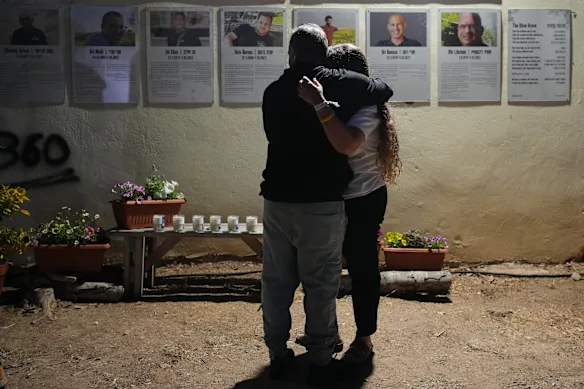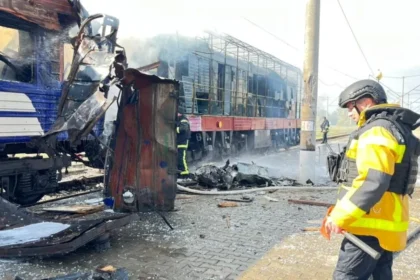Commemoration Amidst Conflict: Two Years Since the October 7 Attacks in Israel
Kfar Aza, Israel – As dawn broke on October 7, residents of Kfar Aza, a farming community near the Gaza border, gathered to remember the tragic events that unfolded two years ago. On this day, approximately 1,200 people lost their lives in a Hamas-led assault, marking a pivotal moment in the ongoing Israeli-Palestinian conflict. The somber atmosphere was punctuated by the sounds of sirens and distant artillery, a stark reminder of the persistent violence that has engulfed the region.
A Day of Remembrance
The anniversary was marked by a series of memorials, despite the Israeli government’s decision to forgo a state ceremony due to the Jewish holiday of Sukkot. Residents and supporters convened in Kfar Aza and other border communities, as well as in urban centers across Israel, to honor the victims and express their grief. The day was characterized by a palpable sense of loss and a yearning for peace, as many participants reflected on the toll the conflict has taken on both sides of the border.
Pnina Russo, a local resident whose son Uri was killed while defending Kfar Aza, articulated the collective sentiment: “Two years of war is something terrible, terrible, terrible.” Her words echoed the frustrations of many who have witnessed the devastation wrought by ongoing hostilities.
Voices from Gaza
Across the border in Gaza, the situation remains dire. Yareen Abu Naja, a 44-year-old resident, lamented the hardships faced by her family, stating, “Enough of this injustice and indignity… enough of this war.” The last two years have seen tens of thousands of casualties in Gaza, with entire neighborhoods reduced to rubble. Abu Naja’s voice trembled as she described the relentless suffering, saying that the time felt as if it had stretched for a century.
The backdrop of these commemorations is a complex web of negotiations aimed at ending the conflict, currently taking place in Egypt. The pressure on Israeli Prime Minister Benjamin Netanyahu is mounting, as public sentiment increasingly favors a cessation of hostilities. Recent polls indicate that a majority of Israelis desire an end to the war, while protests continue to erupt, demanding action on hostage situations and a more humane approach to the conflict.
Political Tensions and International Pressure
Netanyahu’s government faces a precarious balancing act. On one hand, there is a growing call for a permanent resolution to the Israeli-Palestinian conflict, including the establishment of a Palestinian state-an idea that Netanyahu has historically opposed. On the other hand, far-right factions within his coalition threaten to destabilize his administration if he pursues peace negotiations.
Internationally, Israel’s standing is increasingly precarious. Allies and neighboring countries are advocating for a resolution that addresses the humanitarian crisis in Gaza, while human rights organizations have raised alarms about the legality of Israel’s military actions, labeling them as potential acts of genocide.
In a surprising turn, Hamas recently expressed willingness to consider a peace plan proposed by former U.S. President Donald Trump, contingent upon further discussions and the release of Israeli hostages. This development adds another layer of complexity to the already fraught negotiations.
Personal Stories of Loss and Hope
In Kfar Aza, Russo’s memories of her son Uri are bittersweet. She described him as a beautiful and intelligent individual, whose absence has left an indelible void. “I miss him very much,” she said, her voice heavy with sorrow. Yet, she also expressed a deep concern for the children in Gaza, recognizing the shared humanity that transcends borders. “It has to change,” she urged, reflecting a desire for reconciliation amidst the chaos.
In Tel Aviv, Rotem Cooper, whose parents were affected by the October 2023 attack, shared a cautious optimism regarding the ongoing negotiations. His mother was released after 17 days in captivity, but his father was reported killed. “We’ve been on that road of false hope many times,” he cautioned, yet he acknowledged the potential for progress in the current talks.
The Human Cost of War
As the day progressed, the stark realities of life in Gaza were echoed by voices like that of Iman Al-Ijla, a 23-year-old displaced resident. She described the pain of losing family members and the relentless struggle for survival in a war-torn landscape. “We’ve been displaced for two years now… life has been long days and longer nights,” she lamented, holding onto a fragile hope for peace.
Yamen Adwan, a 26-year-old living in a displacement camp, painted a grim picture of his existence. “My life is hell,” he stated, reflecting on the loss of his home, job, and friends. His words encapsulate the despair felt by many in Gaza, where the humanitarian crisis continues to deepen.
A Shared Desire for Peace
As night fell on the eve of the anniversary, families on both sides of the border gathered to remember their loved ones. Alex Tavgen Goldman and his wife Natalie visited the memorial site for their daughter, Katerina, who was killed at the Nova music festival during the initial attack. “It feels like a giant cemetery here; the ground is soaked with blood,” Alex remarked, highlighting the profound grief that permeates the region.
The commemoration of October 7 serves as a poignant reminder of the human cost of conflict. As both Israelis and Palestinians grapple with their losses, there is a shared yearning for an end to the violence. The voices of those affected by the war resonate with a common plea: “Enough is enough.”
Conclusion
The two-year anniversary of the October 7 attacks in Israel underscores the urgent need for dialogue and reconciliation. As families mourn their losses and communities reflect on the devastation, the hope for peace remains a fragile yet persistent thread. The ongoing negotiations in Egypt may hold the key to a resolution, but the path forward is fraught with challenges. In the face of adversity, the desire for a better future persists, echoing the sentiments of those who have suffered on both sides of the conflict.










